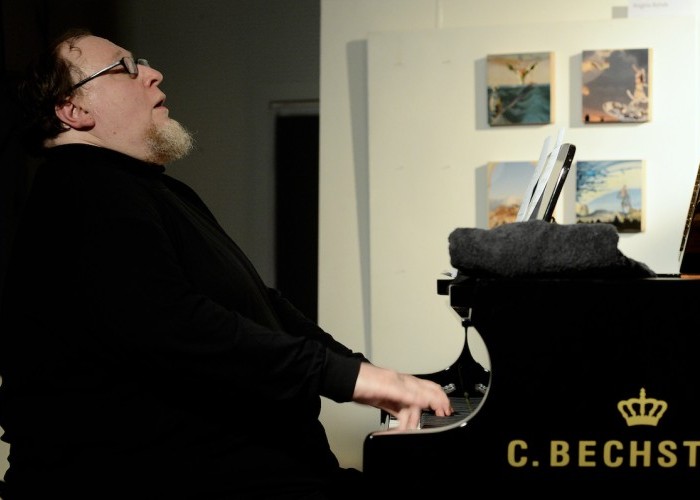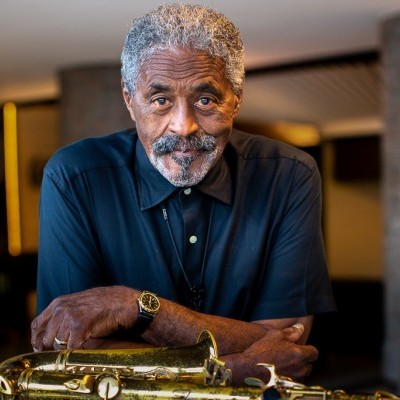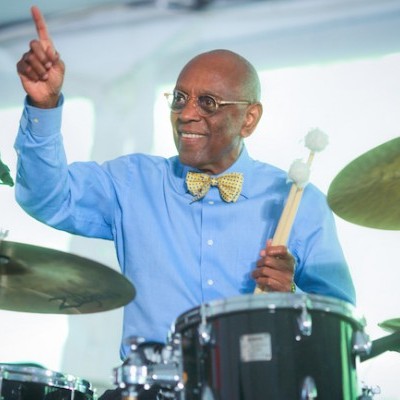Apr 2, 2024 12:59 PM
Saxophonist, Sonic Explorer Casey Benjamin Dies at 45
Casey Benjamin, the alto saxophonist, vocalist, keyboardist and producer who stamped his distinctive sounds on the…

Pianist Simon Nabatov has released dozens of albums on Leo.
(Photo: Gerhard Richter)Leo Feigin brought lots of passion but little music-industry experience to the job when he launched his namesake label in 1979, heralding the arrival of the Leo imprint with the now-classic album Salutes Bessie Smith by keyboardist, singer and AACM pioneer Amina Claudine Myers. Still, he was savvy. Fresh on the heels of that title, Feigin introduced the sounds of Soviet jazz to the world, with the first album by the Ganelin Trio to see release beyond the Iron Curtain. Four decades later, the label head laughs when asked if he initially envisioned his endeavor lasting this long.
“There were no ideas beyond one LP,” Feigin said. “After several LPs, I realized this is what I want to do.”
This year, the label celebrates its 40th anniversary: While other imprints dedicated to the avant-garde have come and gone, Feigin’s has soldiered on. His catalog is flush with recordings of major figures like Anthony Braxton, Cecil Taylor, Sun Ra, Evan Parker and Marilyn Crispell. But perhaps his greatest achievement has been giving a platform to artists from countries that weren’t known for free-jazz or improvised music.
“The origin of the music is not important,” he said. “What is important is the originality of the music.”
During Leo’s first decade, Feigin released dazzling sounds from Soviet artists like Sergey Kuryokhin, Valentina Pomomareva and Sainkho Namtchylak. And in 1989 came the monumental 10-disc set Document: New Music From Russia, showcasing a wildly divergent array of work, much of it produced illicitly amid Soviet suppression. Feigin, who left Russia in 1973 and settled in London, where he worked for the Russian service of the BBC, drew on a growing set of contacts from his homeland to share the music.
Pianist Simon Nabatov, another Russian émigré, has released dozens of albums on Leo during the past two decades, and recognizes the importance of Feigin’s work: “It was nothing short of a heroic act for everyone involved—smuggling forbidden music out of the Soviet Union, giving musicians their voice in the West and placing this cultural phenomenon on the global map, not known prior to Leo’s activities.”
“Russia is a very special case for me,” Feigin said. “The music scene is phenomenal. But it’s very difficult to penetrate, even now. That’s why I’ve always had this compassion. I always wanted to bring some Russian stuff.”
This fall, the label founder will take a touring jazz festival to Moscow, St. Petersburg, Arkhangelsk and other cities for its eighth iteration.
Nabatov is just one of many figures who’ve maintained a long relationship with the label. “Leo combines the best qualities one can wish for in a label chief: curiosity and passion for creative music, and unwavering integrity in dealing with musicians,” he said.
Part of that integrity involves encouraging artists to work freely with other imprints. “At a very early stage, I realized that the more exposure an artist gets with other labels, the faster his progress towards the top is going to be,” Feigin said.
These days, Feigin lives in remote Kingskerswell, some 200 miles from London, and no longer takes an active role in producing music, instead handling administrative tasks while the musicians themselves record and design artwork. But he remains committed to the task.
While Leo continues to work with established figures like Ivo Perelman, Silke Eberhard and Frank Gratkowski, much of its energy is invested is lesser-known talent. “There are different reasons why I produce a CD, but one of the reasons is to encourage,” Feigin said. “The music might not be perfect, but the encouragement must be there, and it always pays, always.” DB

Benjamin possessed a fluid, round sound on the alto saxophone, and he was often most recognizable by the layers of electronic effects that he put onto the instrument.
Apr 2, 2024 12:59 PM
Casey Benjamin, the alto saxophonist, vocalist, keyboardist and producer who stamped his distinctive sounds on the…

“He’s constructing intelligent musical sentences that connect seamlessly, which is the most important part of linear playing,” Charles McPherson said of alto saxophonist Sonny Red.
Feb 27, 2024 1:40 PM
“I might not have felt this way 30 to 40 years ago, but I’ve reached a point where I can hear value in what people…

Albert “Tootie” Heath (1935–2024) followed in the tradition of drummer Kenny Clarke, his idol.
Apr 5, 2024 10:28 AM
Albert “Tootie” Heath, a drummer of impeccable taste and time who was the youngest of three jazz-legend brothers…

“Both of us are quite grounded in the craft, the tradition and the harmonic sense,” Rosenwinkel said of his experience playing with Allen. “Yet I felt we shared something mystical as well.”
Mar 12, 2024 11:42 AM
“There are a few musicians you hear where, as somebody once said, the molecules in the room change. Geri was one of…

Henry Threadgill performs with Zooid at Big Ears in Knoxville, Tennessee.
Apr 9, 2024 11:30 AM
Big Ears, the annual four-day music celebration that first took place in 2009 in Knoxville, Tennessee, could well be…